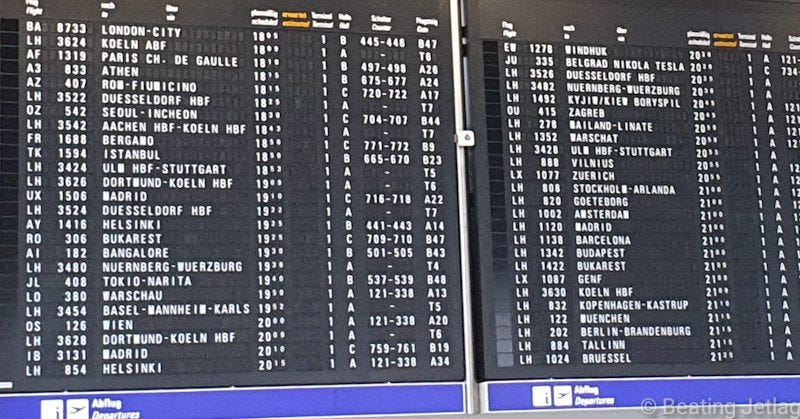5 Insider Tips to avoid being victim of flight disruptions
Flight cancellations and delays can impact your holiday plans. Here are my tips to reduce risk and impact of flight disruptions when planning your next trip.
Flight cancellations and delays have dramatically increased since travel returned to pre-pandemic levels.
This is due to many reasons, including staffing shortages in many countries. While it’s impossible to predict whether a flight will be cancelled or delayed, there are ways to minimize potential disruptions to holiday plans and those carefully crafted travel itineraries.
Years spent working in the travel industry taught me how to anticipate and cope with major flight disruptions.
I’ve been stranded on the other side of the world for the most unexpected reasons (Biggest storm of the year, anyone?). Yet most of the times I’ve managed to arrive at destination and begin my itinerary with minimal disruptions.
How? By planning for the unexpected and knowing my rights as a passenger.
And a bit of luck, of course.
In this article I’ll share my most successful tactics, perfected after years of travelling.
1 - Avoid booking flights “at risk”
If you have booked the last flight of the day, chances are you’ll have to shift your entire itinerary by one day if your flight gets cancelled. In fact, some airports don’t allow departures or arrivals at night (this is called “night flight curfew”).
One way to mitigate this risk: Book an earlier flight or plan your first one or two days at destination as a “buffer” before moving on to the next stop of your itinerary.
This also increases the chances of having your luggage sent to you on a later flight in the event that it was lost along the way.
Another type of flights that I consider “at risk” are flights with short connection times. When planning my trip I try avoiding connections with a stopover below 1.5 hours in smaller airports and below two hours in larger airports.
Surely, non-stop flights are less at risk but sometimes also more expensive than flights with one or more stops.
2 - Check the airline AND airport apps before heading to the airport
It’s a good habit to always check for flight information on both the airline and the airport apps before heading to the airport. Airport apps have significantly improved in the last years, now offering anything from flight updates to the option of pre-booking a slot at the security checks.
In case the flight is delayed (or worse, cancelled) you’ll save on transportation costs to the airport and maybe get the chance to enjoy that extra free time.
3 - Know your rights as a passenger
Every country or region has its own regulation protecting passenger rights. In Europe, this regulation is called EU 261. While most airlines clearly communicate passengers’ rights, sometimes it helps to be aware about what you are entitled to in case of flight delays or cancellations.
Oversimplified, the EU 261 regulation covers flights cancellations and delays of two or more hours, offering care and/or compensation between 250-600 EUR depending on the total delay, the flight distance, the reasons for the delay, and when this delay/cancellation was communicated to the passenger.
Good to know:
A compensation might be denied by the airline due to “exceptional circumstances” (for example poor weather conditions, strikes, security risks, unexpected deficiencies in flight safety). It's reasonable to ask the airline more details about the nature of these circumstances, possibly while still at the airport;
However, even in case of exceptional circumstance, passengers might be entitled to refreshments (food and beverages) and a free hotel stay in case of departure the next day;
According to some readers, it occurred that an airline denied compensation to an infant below two years, since travelling for free;
It’s always worth checking with the airline if an alternative flight with other airlines, or “sister” airlines, is also possible (in airline jargon “reprotecting”) ;
Some airlines might offer vouchers as a first option, but passengers are entitled to cash compensation.
More information about EU 261 regulation can be found here.
4 - Consider a travel insurance (and check for double coverage, too!)
If you are planning to take one or two long holidays during the year, it might be a good idea to have a yearly travel insurance.
While a regulation like the EU 261 compensates disruptions mainly during the trip from A to B, a travel insurance (depending on the package you’'ll choose) might cover disruptions after arriving at destination.
Example: You arrive at destination one day later than expected. A travel insurance covering delays might compensate you for one hotel night or one excursion that you had booked but could not make use of.
When subscribing to a travel insurance, I always:
Check carefully the insurance conditions (what’s covered and what is not, what needs to be done in case of disruption, etc..)
Make sure I’m not buying redundant insurance
Nowadays so many products include a travel insurance, that it’s sometimes easy to lose track. Examples include credit card insurances, insurances included with flight bookings and car rentals, as well as travel insurances bought separately.
It’s best to check carefully to avoid overlaps and paying multiple times for the same type of coverage.
5 - Book directly with the airline
While this is not always the case (and not always the cheapest option) it’s sometimes a good idea to book a flight directly on the airline’s website (www.airline.com).
In fact, in case of flight cancellations, you’ll be able to speak directly and claim compensation with the airline instead of a third party that mediates between you and the airline.
Finally - Be kind with airport staff and customer service
Flight disruptions can be cause of much stress. I’ve once landed at destination with 7 hours 50 mins delay, but wasn’t entitled to any compensation because local regulations only compensated for delays above 8 hours.
With a lot of patience and several exchanges with the airport staff and customer service I finally managed to get a flight voucher from the airline, as a sign of goodwill.
What I’ve learned from that episode: An extra bit of kindness and patience with the airport staff and customer agents always pays off.
Another possibility is to request miles to the airline as an alternative form of compensation (provided that you are registered to a frequent flyer program, which I always recommend before flying with any airline).
About me:
As a passionate traveler and airline & hospitality expert I've been lucky to experience travel from behind the scenes -From crossing the Andes by bus, to flying Business class to the Maldives.
Some fun facts about my trips:
I’ve visited 5 of the 7 New World Wonders
Lowest point I’ve reached: Death Valley, California at -86 mt (-282 ft) altitude
Highest point I’ve reached: The Andes, 5,050 mt (16,568 ft) altitude
I've stayed at 100+ accommodations, from a tent in the Savannah to a houseboat on a French river
I’ve travelled 350,000+ km across 45+ countries and 5 continents by bus, car, boat, bike, hiking and so much more…
In my blog Beating Jetlag I share my travel experiences, insider tips and behind-the-scenes content for smart adventurers, as well as travel marketing recommendations for Creators. You can read more about me here.







This was great! Another revelation we thought about post-trip was to book direct flights if possible and reasonably priced to minimize all the dominoes falling should a flight be delayed. Our flight coming home from Mexico was such a breeze, mainly because it was a direct flight, so in the future I will be buying more direct flights if possible, even if it's a few hundred dollars more.